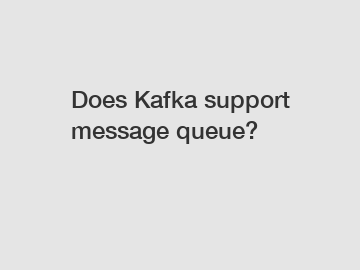Jan. 05, 2024
Business Services
Does Kafka support message queue? Yes, indeed! Kafka's versatile architecture allows it to function as a high-performance distributed messaging system, making it an excellent choice for scalable, fault-tolerant data streaming applications. Let's delve into the origins of this capability, explore the process of how Kafka supports message queuing, and discuss its significance and impact in the industry.
Background and Origins:
Apache Kafka was initially developed by LinkedIn to address the challenges they faced while handling large-scale data streams in real-time. It was open-sourced in 2011, gaining significant popularity due to its ability to efficiently process, store, and distribute enormous volumes of data across multiple applications and systems. Alongside this primary focus, Kafka also provides a robust message queuing functionality.

Supporting Message Queuing:
Kafka's architecture enables it to support message queuing by leveraging the concept of topics and partitions. Instead of relying on traditional message queue models that require point-to-point communication, Kafka adopts a publish-subscribe pattern. Producers write messages to specific topics, while consumers subscribe to these topics to receive the messages. This decoupling allows for flexible and scalable communication between various producers and consumers.
Kafka's message queuing system also utilizes a log-based structure. Messages are appended to the end of a topic partition's commit log in the order they are received, ensuring strict message ordering within a partition. Furthermore, Kafka allows for multiple consumers to read from different partitions concurrently, providing parallel processing capabilities and increased throughput.
The significance and impact:
1. Scalability: Kafka's distributed nature enables it to handle massive workloads across multiple machines and clusters, making it highly scalable. The message queuing support ensures that producers can efficiently distribute messages to a large number of consumers without causing overload or bottlenecks.
2. Fault-tolerance: Kafka's replication mechanism ensures data durability and prevents data loss even in the event of node failures. By maintaining multiple replicas of each partition, Kafka guarantees high availability and fault-tolerance, which is crucial for mission-critical systems.
3. Real-time streaming: Kafka's low latency and high throughput make it ideal for real-time data streaming and processing applications. The ability to support message queues allows data to be efficiently consumed and processed in a continuous flow, enabling timely insights and actions.
4. Ecosystem integration: Kafka seamlessly integrates with various tools and frameworks, forming an extensive ecosystem. With easily available connectors, developers can connect Kafka to other data storage systems or processing engines, enhancing its overall capabilities.
Conclusion:
In conclusion, Kafka indeed supports message queuing, offering a robust and scalable solution for distributed messaging needs. By adopting a log-based structure, Kafka can handle enormous data volumes, provide fault-tolerance, and support real-time streaming applications. Its significance and impact are evident in its scalability, fault-tolerance, real-time capabilities, and the extensive ecosystem it has built. As Kafka continues to evolve, it remains a go-to choice for organizations seeking efficient and reliable data streaming solutions.
If you are looking for more details, kindly visit Event Stream Connectors, Event Streaming Platform Vs Message Queue, Event Streaming Connector.
If you are interested in sending in a Guest Blogger Submission,welcome to write for us!
All Comments ( 0 )